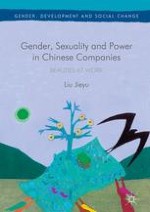2017 | OriginalPaper | Buchkapitel
2. Becoming ‘White-Collar Beauties’ in Urban China
verfasst von : Liu Jieyu
Erschienen in: Gender, Sexuality and Power in Chinese Companies
Verlag: Palgrave Macmillan UK
Aktivieren Sie unsere intelligente Suche, um passende Fachinhalte oder Patente zu finden.
Wählen Sie Textabschnitte aus um mit Künstlicher Intelligenz passenden Patente zu finden. powered by
Markieren Sie Textabschnitte, um KI-gestützt weitere passende Inhalte zu finden. powered by
